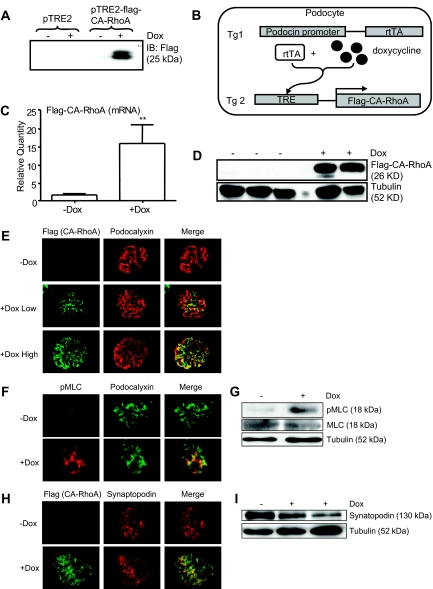Figure 1.
Establishment of podocyte-specific, Dox-inducible expression of CA-RhoA in mice. (A) Flag-tagged CA-RhoA was subcloned into the vector, pTRE2, and was transfected into HeLa cells stably expressing rtTA. Cells were treated with Dox (1 μg/ml) for 16 hours, and cell lysates were subjected to immunoblotting with anti-Flag antibody. Inducibility of CA-RhoA by Dox was confirmed. (B) Schematic representation of the strategy to establish the mouse line (see the Concise Methods section). (C through I) Double transgenic mice (2 to 3 months old) were treated with Dox (4 mg/ml in drinking water) or vehicle (−Dox) for 4 weeks. (C) Glomerular lysates were analyzed by real-time PCR for mRNA expression of the transgene. Flag-CA-RhoA mRNA was significantly induced by Dox (n = 8) versus −Dox (n = 9), **P < 0.001. (D) Glomerular lysates were analyzed by immunoblotting using anti-Flag antibody. Flag-CA-RhoA protein was induced by Dox. (E, F, and H) Kidney sections were immunostained for Flag (for CA-RhoA), pMLC, podocalyxin, and synaptopodin. Dox induced the expression of CA-RhoA in glomeruli, in a pattern consistent with the podocyte distribution. See Figure 3 for definition of low/high responders in (E). (G and I) Glomerular lysates were immunoblotted for pMLC, MLC, synaptopodin, and tubulin.

